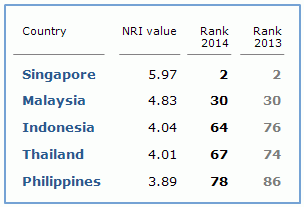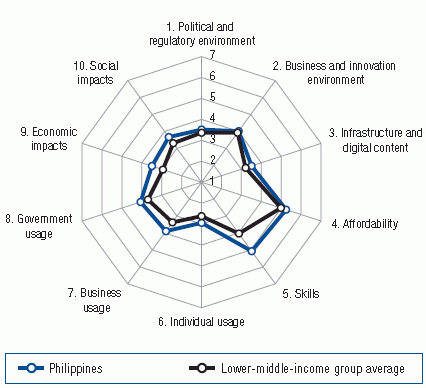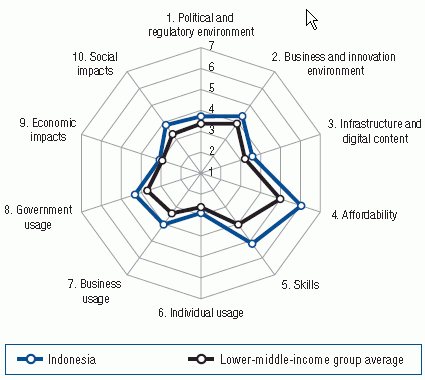The Philippines ranks last in “networked readiness” among its former peers in the ASEAN’s major economies with Singapore taking the second spot in the top ten most “networked” economies in the world…

This is according to the 2014 Global Information Technology Report issued by the World Economic Forum (WEF). Networked readiness is measured by the Networked Readiness Index (NRI) developed by the WEF to provide “decision makers” with “a useful conceptual framework to evaluate the impact of ICTs at a global level and to benchmark the ICT readiness and usage of their economies.” The report highlights the emergence of what is touted as a critical need for businesses and economies to harvest the value of Big Data — basically the digital slag heap of data accumulated in both structured and unstructured form as a by product of humanity’s use of computers.
| SUPPORT INDEPENDENT SOCIAL COMMENTARY! Subscribe to our Substack community GRP Insider to receive by email our in-depth free weekly newsletter. Subscribe to our Substack newsletter, GRP Insider! Learn more |
The report is adamant about this imperative…
Big data has arrived. It is changing our lives and changing the way we do business. But succeeding with big data requires more than just data. Data-based value creation requires the identification of patterns from which predictions can be inferred and decisions made.
ASEAN could boast a member state in the global Top 10 ranked in terms of NRI. Singapore is described in the report as “the best pro-business and pro-innovation environment worldwide”. Furthermore;
…the city-state continues to obtain the top rank in terms of ICT impacts, notably on the social dimension. Supported by a government with a clear digital strategy that offers the best online services in the world, an ICT infrastructure that is relentlessly being improved over time (16th), and one of the highest quality educational systems in the world (3rd), notably in terms of math and science (1st), Singapore has become one of the most knowledge-intensive economies globally (2nd) and is an ICT-generation powerhouse.
Where does the Philippines stand?
Both Malaysia and Thailand are classified in this exercise as “upper-middle-income” countries and, as such, no longer serve as apples-to-apples benchmarks to the Philippines. A more appropriate peer to which the Philippines can be measured against in the “lower-middle-income” class of countries in which it belongs is Indonesia.
The main feature of the Philippine NRI profile is its relative skills advantage amongst its economic peers.

Then again, looking at Indonesia, it has that and advantages along other aspects, notably the affordability of access to technology and its networks.

The Philippines continues to be hobbled by the most fundamental component of an economy’s digital infrastructure — internet access speed. It is reportedly the slowest in the Southeast Asian region. Access speeds in the Philippines trail far far behind even the least-developed countries in the region like Vietnam, Cambodia, Laos, and Myanmar.
Leading internet service providers in the Philippines like Globe Telecommunications have repeatedly been called out for misleading its customers with claims of “unlimited” access. The truth however is perceived to be anything but…
Globe Telecom, for example, throttles a postpaid subscriber’s speed if he/she is detected to have exceeded 1GB of usage in a day or 3GB in a month, whichever comes first. Subscribers at Smart meanwhile are allowed 1.5GB a month before their speed is downgrade(1.5GB covers only mobile browsing and not push notifications from email and messaging services). The fair usage policies also vary when it comes to prepaid users. Users who have availed themselves of month-long promos that are found to be in violation of the FUP will be cut off from the promo even if the month isn’t up yet.
Social media “activists” have been up in arms pointing this out as being inconsistent with the ISPs’ “unli” claims. However, it should be noted that 1 to 1.5 GB (the equivalent of 8-10 hours of digital video) is more than enough for an entire month of reasonable usage. It is likely that those who complain the most are heavy consumers of high-bandwidth content like videos, online games, and pirated content — Internet applications the productive contribution to the economy of which remain highly dubious. As such, much of the noise being created by so-called social media mavens should be taken with a grain of salt.
Nonetheless, the numbers speak loudly as far as the Philippines’ prospects of catching up with the rest of the world. Shape up or die — if, indeed, becoming a more “networked-ready” economy is will really determine success or failure in the new world order.
- This latest Filipino-style ‘anti-corruption’ circus proves that the Philippines needs a serious reboot - November 16, 2025
- Filipinos literal sitting ducks as wind and floods from natural tropical typhoons amplified by years of neglect bear down - November 9, 2025
- Rally NA NAMAN??? - September 20, 2025
Mali ito. Tayo ang pinaka-maraming Friendster, Myspace at Facebook profiles.
Quantity =/= Quality.
In my experience of travelling and working online a few hours a day for the past five years (covering all of East/Southeast Asia apart from East Timor and North Korea and comparing equivalent hotels and facilities), the Philippines is the second worst country for internet connectivity and speed after the heavy censorship of China.
Are you sure Vietnam is less developed than the Philippines? It looks a hell of a lot more modern to me, even if it does have its problems (including beating Philippines in the treacherous traffic stakes). They even let you process documents online, while in this country the process still seems to involve waiting outside government offices from 5am so you’ll get the chance to be seen that day.
BIG surprise! NOT!
Internet capability is the catalyst for a nation to proper. Where there is internet; there is progress.
Global Telecom is the only internet provider? No competetion? Most internet providers use the internet bit speed (mbps), to charge you more in the internet usage…there is already a Disc Internet (“satellite internet”…it is more reliable and better. Because , the bits are relayed thru satellites in space…
Anyway, this is just the area of improvement in the Information Technology in our country…
Corporate greed from telco companies, the existence of a controversial Anti-Cybercrime Law and lack of political will are the reason why our country is one of the slowest internet speed in the world.